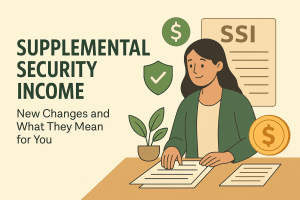Supplemental Security Income (SSI) updates: what you need to know
Supplemental Security Income (SSI) updates include changes to eligibility criteria, benefit amounts, and application processes, impacting how beneficiaries manage their assistance and financial planning.
Supplemental Security Income (SSI) updates can significantly impact your financial situation. Wondering what changes are on the horizon? Let’s dive into the latest updates and how they might affect you.
Understanding Supplemental Security Income (SSI)
Understanding Supplemental Security Income (SSI) is crucial for individuals who may rely on this type of financial assistance. SSI provides support to older individuals, blind, or disabled persons with limited income and resources.
What is SSI?
Supplemental Security Income is a federal program designed to help those in need. It ensures that eligible individuals can meet basic needs for food, clothing, and shelter. Funded by general tax revenues, SSI serves as a safety net for vulnerable populations.
Eligibility Criteria
To qualify for SSI, individuals must meet specific criteria, including:
- Be aged 65 or older, blind, or disabled.
- Have limited income and resources.
- Be a U.S. citizen or meet certain immigration requirements.
These requirements ensure that the assistance reaches those who truly need support. However, verification of eligibility can sometimes be complex, as the application process might require documentation of income, living arrangements, and medical conditions.
How Benefits are Calculated
SSI benefits vary depending on several factors, including living arrangements and income. The federal benefit rate can change yearly, usually based on the cost of living adjustments. For many recipients, this means that staying informed about updates can be vital. You may also receive additional state supplements based on local regulations, which can increase your total benefit amount.
Furthermore, understanding the calculation method is essential. It factors in your income and spending adjustments. For instance, not all income counts towards your limit, so some recipients may still receive benefits even if they have a part-time job.
Knowing your rights and how to advocate for yourself can enhance your experience with the SSI program and ensure you receive the support you deserve.

Recent changes in SSI eligibility criteria
Recent changes in SSI eligibility criteria can significantly affect many individuals seeking assistance. Staying informed about these updates is essential for beneficiaries and applicants alike. New regulations can influence who qualifies for benefits and how much support they can receive.
Changes to Income Limits
One major change involves adjustments to the income limits for SSI. The federal government occasionally revises these thresholds, taking inflation into account. These adjustments aim to ensure that assistance aligns with current living expenses.
Resource Limits Update
Furthermore, the resource limits have also seen adjustments. For individuals, the maximum countable resources have changed, impacting eligibility. Knowing what counts as a resource is vital for prospective applicants:
- Bank accounts, stocks, and bonds count towards your resource limit.
- Your home and one vehicle used for transportation do not count.
- Some personal items and burial plots may also be excluded.
Understanding these distinctions helps potential applicants effectively navigate the SSI application process.
Impacts of Medical Reviews
Another recent change is related to medical reviews for continuing eligibility. These reviews assess whether beneficiaries still meet the necessary criteria. Now, the frequency of these reviews may change based on the beneficiary’s condition. For many, the outcome determines ongoing benefits, so being prepared is essential.
Receiving updates on these potential changes can empower individuals to maintain their support and stay ahead of possible eligibility challenges. It’s crucial to regularly check the official SSI resource page for the latest information about eligibility and any new requirements that may arise.
Impact of cost-of-living adjustments on SSI
The impact of cost-of-living adjustments on SSI is significant for recipients. These adjustments are designed to help beneficiaries cope with inflation and increases in living expenses. Understanding how these changes affect monthly payments can help recipients plan their budgets more effectively.
What Are Cost-of-Living Adjustments?
Cost-of-living adjustments (COLAs) are annual increases in SSI benefits based on inflation. When prices for goods and services rise, the government reviews these rates to adjust SSI payments accordingly. This ensures that the purchasing power of beneficiaries remains stable over time.
How Are COLAs Calculated?
COLAs are calculated using the Consumer Price Index (CPI), which measures price changes in a basket of goods and services. A key point is that if there is no increase in the CPI, there will be no COLA for that year. Beneficiaries often rely on these adjustments to keep pace with living costs:
- Help offset rising housing costs.
- Support increasing healthcare expenses.
- Maintain standard of living amid inflation.
Understanding how these adjustments work is essential for recipients. Many rely on these increases to cover basic needs like food and housing. Without these adjustments, beneficiaries might struggle to keep up with their daily expenses.
Recent Changes in COLAs and Their Effects
In recent years, COLAs have seen considerable fluctuations. Higher inflation rates can lead to larger adjustments, impacting how much recipients receive monthly. For instance, if inflation spikes, beneficiaries might see a larger increase in their payments, which can be a relief during tough economic times.
On the other hand, smaller adjustments might leave some individuals feeling stretched thin. Therefore, it is crucial to stay informed about upcoming COLAs and how they can help manage finances. By planning around these adjustments, SSI recipients can better navigate their financial landscape.
Common questions about SSI updates
Common questions about SSI updates arise frequently among beneficiaries and applicants. Understanding these updates is vital for anyone involved in the program. Let’s explore some of the most typical concerns people have.
What are the most recent updates to SSI?
The latest updates to SSI often include changes in benefit amounts, eligibility criteria, and application processes. Keeping up with these changes helps beneficiaries know what to expect and how to adjust their plans accordingly. Official resources, like the Social Security Administration (SSA) website, provide the most accurate and updated information.
How often are SSI benefits adjusted?
SSI benefits are usually adjusted annually to reflect cost-of-living changes. These adjustments help ensure that recipients can keep up with inflation. However, in some years, there might not be an increase if the cost-of-living remains stable. Understanding this helps beneficiaries anticipate their financial situation.
Do I need to reapply for SSI every year?
Generally, you do not need to reapply for SSI each year unless your situation changes. If your income or living arrangements change significantly, you must report these changes to the SSA. This reporting helps maintain your eligibility and informs the SSA of any necessary adjustments.
Where can I find more information about SSI updates?
For more information, the SSA offers a wealth of resources. Their website is a great place to find information on updates, application processes, and eligibility requirements. Additionally, local Social Security offices can provide personal assistance and guidance.
Staying informed is essential for all SSI beneficiaries. Knowing where to find information can make navigating the program easier and more manageable.
Resources for SSI beneficiaries
There are many valuable resources for SSI beneficiaries that can help ensure they receive the assistance they need. Knowing where to find these resources can make a significant difference in managing finances and understanding the program.
Government Resources
The Social Security Administration (SSA) is the primary source for information about SSI. Their website offers comprehensive details about eligibility, benefits, and application processes. Additionally, beneficiaries can visit their local SSA office for personalized assistance.
Community Organizations
Many community organizations provide support for SSI recipients. These organizations often help with:
- Accessing local food banks and nutrition programs.
- Providing legal assistance for benefit appeals.
- Offering financial literacy workshops to better manage funds.
Connecting with these local resources can help beneficiaries navigate their challenges and improve their quality of life. Reaching out to community centers or non-profits focused on financial support makes a big impact.
Online Support Groups
Online forums and support groups can also be helpful for SSI beneficiaries. In these spaces, individuals share their experiences, tips, and advice. Many find comfort in knowing they are not alone in their journey.
These groups often discuss practical topics like how to fill out forms correctly or what to do if benefits are delayed. Participating in these communities provides valuable support and knowledge. Making connections with others facing similar situations can reduce feelings of isolation.
FAQ – Common questions about Supplemental Security Income (SSI)
What updates should I know about regarding SSI?
Recent updates may include changes in benefit amounts, eligibility criteria, and application processes you should stay informed about.
Are there resources to help SSI beneficiaries?
Yes, government resources, community organizations, and online support groups can provide assistance and information.
How often can I expect changes to my SSI benefits?
SSI benefits are typically adjusted annually based on cost-of-living adjustments, but some years may not see an increase.
What should I do if my financial situation changes?
If your income or living arrangements change significantly, it is essential to report these changes to the Social Security Administration.





